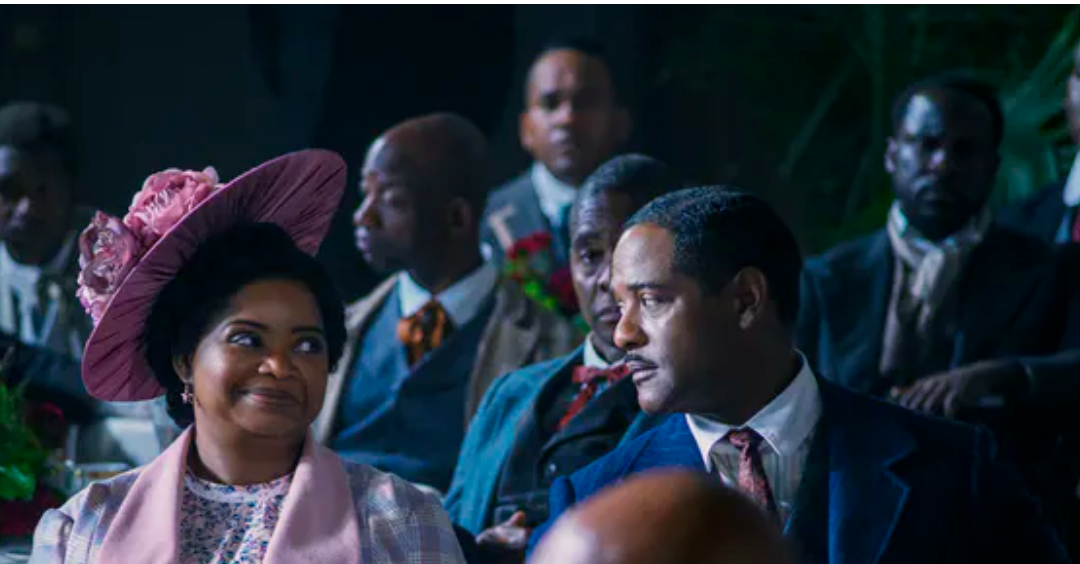
Miniseries about Madam C.J. Walker Leaves Out Philanthropic Legacy
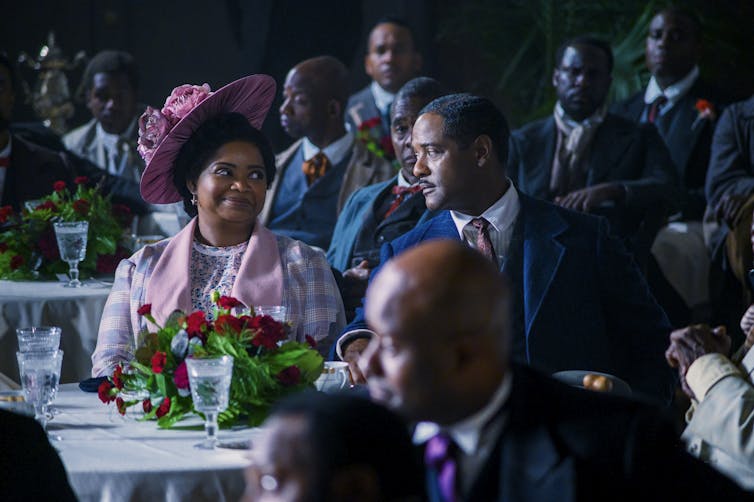
Amanda Matlovich/Netflix
The Netflix series “Self Made: Inspired by the Life of Madam C.J. Walker” brings to life part of a fascinating rags-to-riches tale I’ve been researching for the past 10 years.
Walker, widely documented to have been America’s first self-made female millionaire, made her fortune building an Indianapolis-based beauty products company that served black women across the U.S. and overseas. Today it offers a product line through Sephora.
Oscar-winner Octavia Spencer stars in the miniseries about the African American entrepreneur originally named Sarah Breedlove. Born shortly after emancipation in 1867 on a cotton plantation in Louisiana to a formerly enslaved family, she later adapted the initials and last name of her third husband – played by Blair Underwood in the series. The show imagines Walker’s struggles and successes in a dramatic reinterpretation of the historical record.
I’ve been studying Walker’s archival collections for my upcoming book “Madam C.J. Walker’s Gospel of Giving: Black Women’s Philanthropy during Jim Crow” and speaking about her to audiences around the country for years. I screened the series with great anticipation of how her lifelong generosity and activism would be portrayed in this account that “Indianapolis Monthly” described as having “fictional characters, invented moments, and a few surreal sequences.”
Her philanthropic legacy didn’t make the cut – aside from a few visual footnotes just before final credits roll. Those footnotes touch on her charitable giving to black colleges, social services and activism with the NAACP.
While viewers will enjoy the series, I want them to learn that Walker didn’t just live a life of hard-won opulence. She exemplified black women’s generosity. Her philanthropy and activism imbued every aspect of her daily life. “I am not and never have been ‘close-fisted,’ for all who know me will tell you that I am a liberal hearted woman,” Walker told the audience of the 1913 National Negro League Business meeting sponsored by prominent black leader Booker T. Washington.
More than money
Walker distinguished herself on a philanthropic landscape dominated by white people. Men like John D. Rockefeller and Andrew Carnegie turned to large-scale philanthropy after spending their lives accumulating wealth. In contrast, Walker’s giving began in earnest when she was a poor, young, widowed mother struggling in St. Louis. She gave along the way from what she had, rather than waiting.
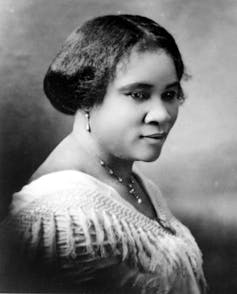
Madam C. J. Walker was the nation’s first self-made female millionaire. Michael Ochs Archives/Getty Images
She had much in common with other black churchwomen, club women, educators and activists. Like Mary McLeod Bethune, Nannie Helen Burroughs and Ida B. Wells-Barnett – and tens of thousands of other working and middle class black women – Walker embodied a versatile generosity that sought to meet communal needs and topple widespread discrimination.
Treasure
Walker was a highly prized donor in the black community. Constantly solicited, she gave money to black-serving organizations across the Midwest and the South.
The Netflix miniseries briefly references her gifts to social services. She supported organizations like Flanner House in Indianapolis, which helped African Americans get jobs, an education and childcare. She made sure that poor families could eat at Christmastime.
The “Indianapolis Freeman,” a black newspaper, reported in 1915 how her company’s office resembled a grocery store due to all the gift baskets that were filled with food. In 1918, she gave US$500 to support the National Association of Colored Women’s campaign to purchase and preserve Cedar Hill, home of abolitionist Frederick Douglass, which still stands today in Washington, D.C.
Walker lacked formal education but she was a lifelong learner who donated thousands of dollars to the Tuskegee Institute in Alabama and other black schools.
She also patronized the arts, supporting Indianapolis painters such as William Edouard Scott and John Wesley Hardrick, whom she wanted to help gain national stature as an artist.
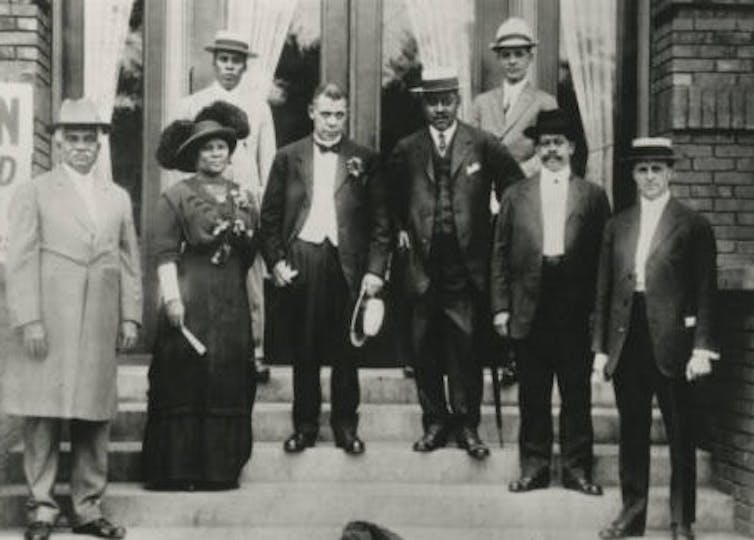
Walker, second from left, and Booker T. Washington (holding his hat) at the opening of a black YMCA in Indianapolis that she supported with her own money and fundraising efforts. Madam C. J. Walker Collection, Indiana Historical Society, CC BY-ND
Time and talent
In addition, Walker belonged to important networks of women that were advancing the cause of freedom from the Jim Crow era’s racism and sexism.
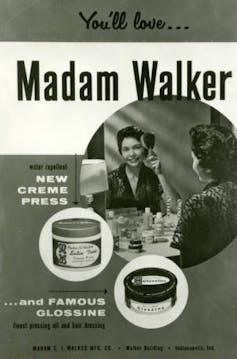
The entrepreneur made her fortune by creating hair care products for African American women. Madam C. J. Walker Collection, Indiana Historical Society, CC BY-NC-ND
She helped the poor through the Mite Missionary Society of St. Paul’s African Methodist Episcopal Church in St. Louis. She supported the National Association of Colored Women, which provided educational and social services to black communities around the country, and advocated for changing public policies.
Testimony
Walker also expressed her generosity by using her voice to speak out against the injustices of Jim Crow discrimination and oppression. She drew attention to sick and injured black soldiers during World War I by visiting and entertaining them at military camps in the Midwest. To black and white audiences, she spoke out publicly about black soldiers’ patriotic sacrifice overseas for freedoms denied them at home, and her full expectation that such freedoms be granted upon their return.
At her first national convention of her sales agents held in Philadelphia, she and her agents collectively raised their voices through a telegram against lynching sent to President Woodrow Wilson. She wanted the government to make lynching a federal crime.
Walker also advocated for temperance, women’s suffrage, female empowerment and civil rights. She secured a pardon for a black man jailed for an alleged murder in Mississippi. And she shared her own encouraging story of success with audiences around the country as an affirmative testimony of the value and dignity of black life amid pervasive hateful and hurtful Jim Crow stereotypes.
‘Netflix and engage’
I hope that many viewers who see “Self-made” and feel inspired by Walker’s story consider a new way to binge on TV: “Netflix and Engage.”
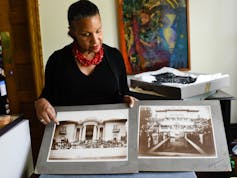
The miniseries is based on a book by A’Lelia Bundles, Walker’s great-great-granddaughter. Sarah L. Voisin/The Washington Post via Getty Images
Learn more about Madam Walker’s story by reading the biographical account written by her great-great-granddaughter – the journalist, A’Lelia Bundles – which inspired the series. Explore other chapters in black women’s history.
Surf Madam Walker’s electronic archive of 40,000 items at the Indiana Historical Society. Consider her influence on the musical and fashion icon Rihanna and today’s beauty culture industry. Visit her company’s former headquarters in Indianapolis. Admire the architecture of her New York mansion where women of color will be trained to become entrepreneurs.
Give to charity. March for a cause.
Like Walker, you may make a difference in someone’s life.
[You’re too busy to read everything. We get it. That’s why we’ve got a weekly newsletter. Sign up for good Sunday reading. ]![]()
Tyrone McKinley Freeman, Assistant Professor of Philanthropic Studies, Director of Undergraduate Programs, Lilly Family School of Philanthropy, IUPUI
This article is republished from The Conversation under a Creative Commons license. Read the original article.
